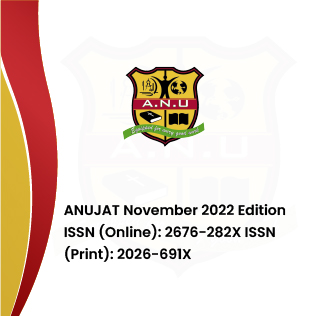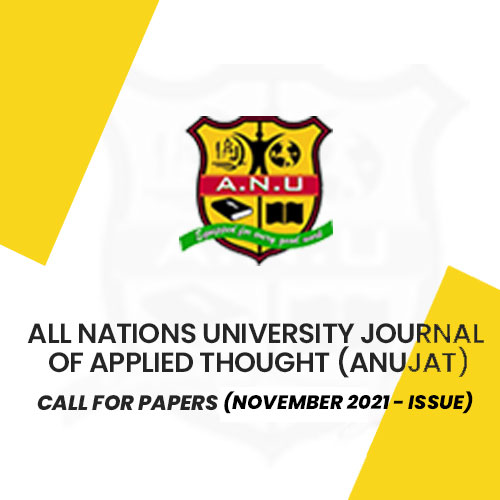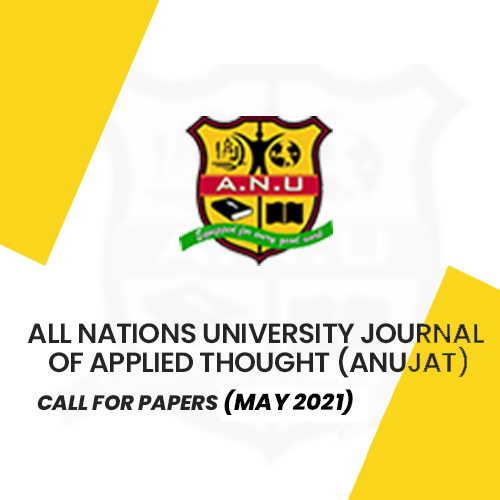Plagiarism is the unethical act of copying someone else’s prior ideas, processes, results or words without explicit acknowledgement of the original author and source. Self-plagiarism occurs when an author utilizes large part of his/her own previously published work without using appropriate references. This can range from getting the same manuscript published in multiple journals to modifying a previously published manuscript with some new data.
All Nations University Journal of Applied Thought (ANUJAT) is having ISSN 2676-282X (online) and ISSN 2026-691X (Print), being published in the months of May and November every year by All Nations University College, Koforidua, Ghana, since 2012. The journal is strictly against any unethical act of copying or plagiarism in any form. Plagiarism is said to have occurred when large portions of a manuscript have been copied from existing previously published resources. All manuscripts submitted for publication to ANUJAT are cross-checked for plagiarism using Turnitin software. Manuscripts found to be plagiarized during initial stages of review are out-rightly rejected and not considered for publication in the journal. In case a manuscript is found to be plagiarized after publication, the Editor-in-Chief will conduct preliminary investigation, may be with the help of a suitable committee constituted for the purpose. If the manuscript is found to be plagiarized beyond the acceptable limits, the journal will contact the author’s Institute / College / University and Funding Agency, if any. A determination of misconduct will lead ANUJAT to run a statement bi-directionally linked online to and from the original paper, to note the plagiarism and provide a reference to the plagiarized material. The paper containing the plagiarism will also be marked on each page of the PDF. Upon determination of the extent of plagiarism, the paper may also be formally retracted.
Types of Plagiarism
The following types of plagiarism are considered by ANUJAT:
- Full Plagiarism: Previously published content without any changes to the text, idea and grammar is considered as full plagiarism. It involves presenting exact text from a source as one’s own.
- Partial Plagiarism: If content is a mixture from multiple different sources, where the author has extensively rephrased text, then it is known as partial plagiarism.
- Self-Plagiarism: When an author reuses complete or portions of their pre-published research, then it is known as self-plagiarism. Complete self-plagiarism is a case when an author republishes their own previously published work in a new journal.
Plagiarism Prevention
The Editorial Board has adopted the stance that plagiarism, where someone assumes another’s ideas, words, or other creative expression as one’s own, is a clear violation of scientific ethics. Plagiarism may also involve a violation of copyright law, punishable by legal action.
Plagiarism includes the following:
- Verbatim (word for word), or almost verbatim copying, or purposely paraphrasing portions of another author’s work without clearly indicating the source or marking the copied fragment (for example, using quotation marks) in a way described under Authors’ responsibilities;
- Copying equations, figures or tables from someone else’s paper without properly citing the source and/or without permission from the original author or the copyright holder.
Any manuscript which shows obvious signs of plagiarism will be automatically rejected. In case plagiarism is discovered in a paper that has already been published by the journal, it will be retracted in accordance with the procedure described under Retraction polic .
To prevent plagiarism the manuscripts are submitted to a plagiarism detection process using iThenticate/CrossRef within SCIndeks Assistant. The results obtained are verified by the Editorial Board in accordance with the guidelines of ANUJAT Ethics Best Practices.
Policy and Action for Plagiarism
ANUJAT respects intellectual property and aims at protecting and promoting original work of its authors. Manuscripts containing plagiarized material are against the standards of quality, research and innovation. Hence, all authors submitting articles to ANUJAT are expected to abide ethical standards and abstain from plagiarism, in any form. In case, an author is found to be suspected of plagiarism in a submitted or published manuscript then, ANUJAT shall contact the author (s) to submit his / her (their) explanation within two weeks, which may be forwarded to a committee constituted for the purpose, for further course of action. If ANUJAT does not receive any response from the author within the stipulated time period, then the Director / Dean / Head of the concerned College, Institution or Organization or the Vice Chancellor of the University to which the author is affiliated shall be contacted to take strict action against the concerned author.
ANUJAT shall take serious action against published manuscripts found to contain plagiarism and shall completely remove them from ANUJAT website and other third party websites where the paper is listed and indexed. The moment, any article published in ANUJAT/ANU database is reported to be plagiarized, ANUJAT will constitute a committee to investigate the same. Upon having established that the manuscript is plagiarized from some previously published work, ANUJAT shall support the original author and manuscript irrespective of the publisher and may take any or all of the following immediate actions or follow the additional course of actions as recommended by the committee:
- ANUJAT editorial office shall immediately contact the Director / Dean / Head of the concerned College, Institution or Organization or the Vice Chancellor of the University to which the author(s) is (are) affiliated to take strict action against the concerned author.
- ANUJAT shall remove the PDF copy of the published manuscript from the website and disable all links to full text article. The term Plagiarized Manuscript shall be appended to the published manuscript title.
- ANUJAT shall disable the author account with the journal and reject all future submissions from the author for a period of 3 or 5 or 10 years or even ban the authors permanently.
- ANUJAT may also display the list of such authors along with their full contact details on the ANUJAT/ANU website.
- Any other course of action, as recommended by the Committee or as deemed fit for the instant case or as decided by the Editorial Board, from time to time.





